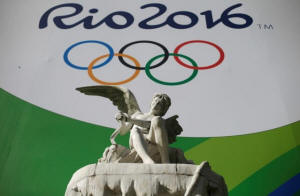|
Rio
will be safest place in world for athletes: USOC
 Send a link to a friend
Send a link to a friend
 [July 01, 2016]
By Steve Keating [July 01, 2016]
By Steve Keating
OMAHA, Nebraska (Reuters) - Even as
gun battles rage in Rio de Janeiro slums, mutilated bodies wash up
on beaches and police and fireman protest, the USOC on Thursday
declared the 2016 Olympics will be the safest place in the world for
athletes once the Games begin.
Following their final board meeting before the Olympics open on
Aug. 5, United States Olympic Committee (USOC) leaders Scott
Blackmun and Larry Probst downplayed the security risks and Zika
threat that have plagued the run-up to the first Summer Games in
South America.
While the Olympic city grapples with rising crime, a recession and
exhausted state finances that could compromise security plans, the
USOC gave preparations a thumbs-up, saying they were confident the
Games would be safe and successful.
"I guess what I would say is that I am bringing my family down
there," Blackmun, the USOC chief executive officer, told reporters.
"I feel like the safest place in the world is going to be the
village and the competition venues so I think our athletes will be
among the safest people in Rio because of all the security around
them.
"It is a complicated world and there is risk associated with
everything but ... we feel really good about Rio's preparation.
There is risk associated with any Games, whether it is terrorism, or
crime or transportation."
 While every Olympics presents unique problems, Rio has certainly had
more than its share of challenges from the threat of a dangerous
drug-resistant "super bacteria" in the waters that will host open
water swimming, canoe and kayak events to transportation chaos and
rampant crime.
'BIG FAILURE'
Even Rio's acting governor this week warned the Olympics could be a
"big failure" while the latest bit of bad news washed up on the sand
of Copacabana Beach when parts of a mutilated body were discovered
just meters (yards) from where beach volleyball athletes will
compete.
"I am not concerned about it, I am not concerned about it for my
family," said Blackmun. "That doesn't mean you don't take all
necessary precautions but I feel very good. I can't wait to go and
every single member of my family is coming with me.
"Like any other Games, our expectation is that when the opening
ceremonies come we are all going to be focused on that as opposed to
these kinds of things."
[to top of second column] |

A giant banner advertising the 2016 Rio Olympics is pictured behind
a statue outside a tunnel which connects Botafogo and Copacabana
neighbourhoods in Rio de Janeiro, Brazil, June 28,
2016.REUTERS/Ricardo Moraes

The Zika threat also continues to hang over the Games with
Australia's Jason Day, the world's top-ranked golfer, announcing
this week that he was withdrawing from the Olympics because of the
virus.
Northern Irishman Rory McIlroy, a four-time major winner, Fiji's
Vijay Singh and Charl Schwartzel of South Africa, have also pulled
out due to Zika concerns.
U.S. health officials have concluded that Zika infections in
pregnant women can cause microcephaly, a birth defect marked by
small head size that can lead to severe developmental problems in
babies.
The World Health Organisation has said there is strong scientific
consensus that Zika can also cause Guillain-Barre, a rare
neurological syndrome that causes temporary paralysis in adults.
"For the most part, the information has not changed all that much,"
said Alan Ashby, the USOC chief of sport performance. "We are
following the leadership of the CDC (Center for Disease Control),
they are our infectious disease experts in this country and we have
a close partnership with them.
"We will have the CDC at our team processing so athletes can have
direct interaction with them."
(Editing by Mark Lamport-Stokes)
[© 2016 Thomson Reuters. All rights
reserved.]
Copyright 2016 Reuters. All rights reserved. This material may not be published,
broadcast, rewritten or redistributed.

 |